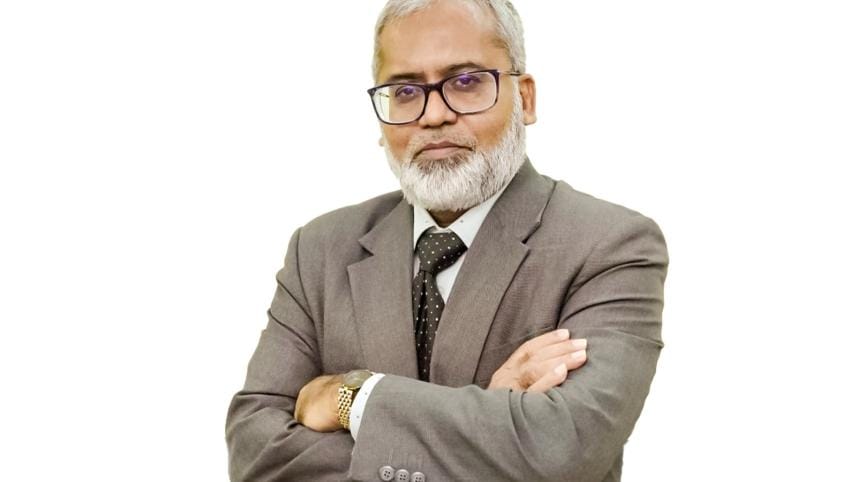Expanding financial access to empower small entrepreneurs

Dr. Md Touhidul Alam Khan, FCMA
Managing Director and CEO
NRBC Bank PLC
The Daily Start (TDS): How have NRBC's financial products supported small entrepreneurs, particularly women and rural business owners, in accessing credit and building resilience?
Dr. Md Touhidul Alam Khan (DMTAK): NRBC Bank is committed to promoting financial inclusion by offering collateral-free microloans that are easily accessible to rural and women entrepreneurs. Since March 2021, we have disbursed approximately BDT 1,500 crore to over 52,500 entrepreneurs. Our NRBC "Sukhi Bangla" product enables new and unbanked entrepreneurs to open accounts with as little as BDT 10 to BDT 100, with minimal documentation requirements.
In remote regions such as chars and haors, we provide loans up to BDT 50,000 at an interest rate of 7 percent, mainly targeting women, without the need for collateral. Additionally, in partnership with the Jayeeta Foundation, we offer women entrepreneurs access to loans up to BDT 50 lakh at a 5 percent interest rate.
TDS: What innovative financial tools or partnerships have emerged to expand inclusion and affordability in underserved markets?
DMTAK: To reach marginalised groups in remote areas, NRBC Bank has launched Sub-Branch Banking, leveraging technology to deliver comprehensive banking services at lower costs. Our Planet App has further simplified banking, allowing customers to perform transactions from the comfort of their homes. This innovative approach helps eliminate barriers and encourages greater participation in the formal financial system.
We have also formed strategic partnerships and developed products to promote financial inclusion with some organisations to support marginalized communities through increased financial access, market linkages, and digital village initiatives. Our participation in the 'Banker–SME Women Entrepreneurs Fair' increased visibility for women-led businesses. Additionally, we introduced nano-credit and app-based services to make banking more affordable for low-income users, extending financial access to areas that were previously excluded from formal finance.
TDS: How does the bank manage risk while ensuring equitable access to finance for low-income borrowers or first-time entrepreneurs?
DMTAK: Our risk management strategy focuses on promoting inclusion by offering small-ticket, collateral-free loans. This approach diversifies exposure across numerous borrowers and helps minimise the impact of individual defaults. By providing low-value accounts and microloans, we lower entry barriers for clients while maintaining effective risk control for the bank. We further reduce risk through collaborations with organisations which assist with training, due diligence, and capacity building efforts.
TDS: What will be the impact of working with iDE to align your financial products with broader development goals such as nutrition, WASH, or agriculture?
DMTAK: Through our intent to partner with iDE under the B4CA (Bamboo for Climate Change) project subject to approval of our Board, we can facilitate credit access for entrepreneurs involved in sustainable ventures such as bamboo farming. This initiative will connect financial support with environmental sustainability, nutrition, WASH, and resilient agriculture. Recently, by this time, we co-hosted a workshop as part of the 'NABAPALLAB' project to identify barriers and develop solutions for unbanked communities in areas like the Sundarbans.
TDS: How do you evaluate the success of your financial inclusion initiatives and what metrics guide future investment and outreach?
DMTAK: We measure our success by the number of entrepreneurs supported, the volume of loans disbursed, the geographic spread of our services, and the affordability of our financial products. Recognition also contributes to our assessment. For instance, NRBC Bank was named the Fastest Growing Microfinance Bank in 2022 by 'Global Economics' in the UK.
iDE, a global nonprofit organisation in 12 countries since 1984, drives poverty reduction through market-driven solutions in Bangladesh, scaling agriculture, WASH, climate resilience, clean energy, and women's empowerment.
This content has been published under 'Catalyzing Markets' - a media campaign jointly initiated by iDE and The Daily Star. This interview is conducted by Md. Zahidur Rabbi.




 For all latest news, follow The Daily Star's Google News channel.
For all latest news, follow The Daily Star's Google News channel.
Comments